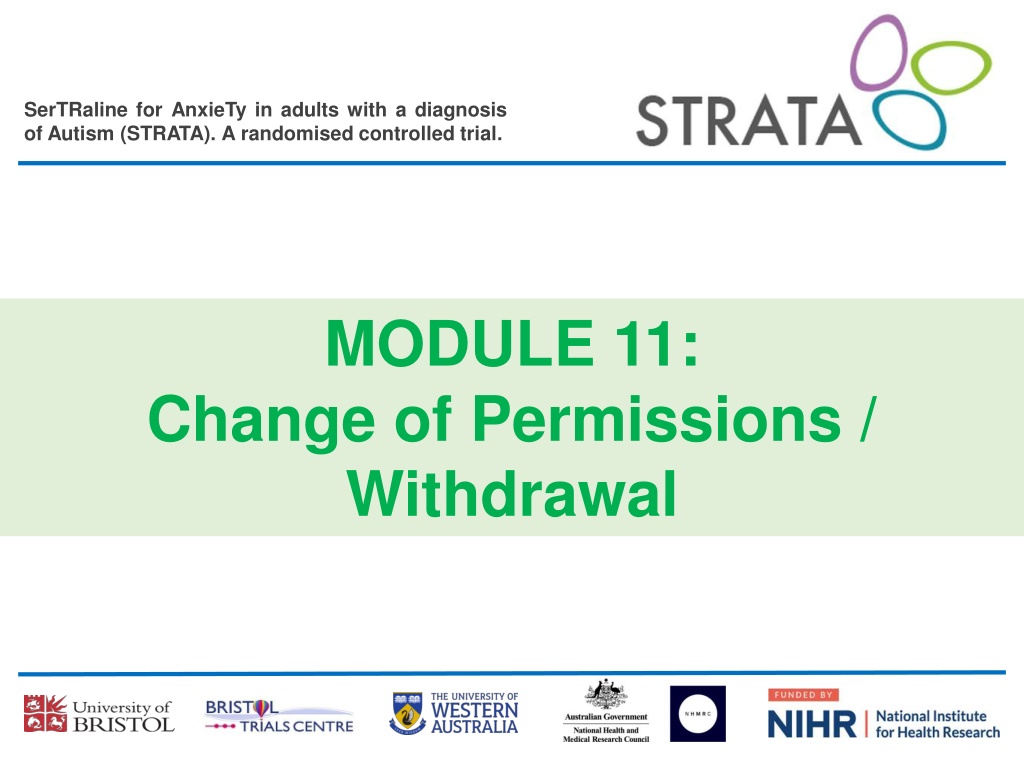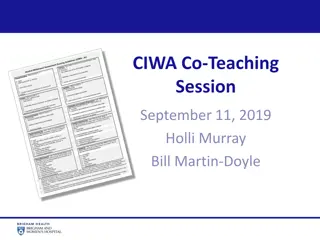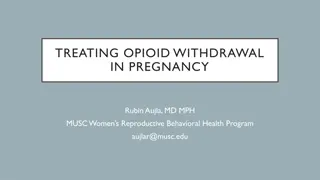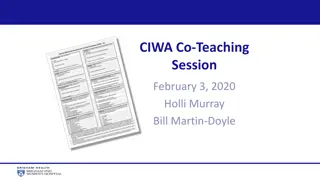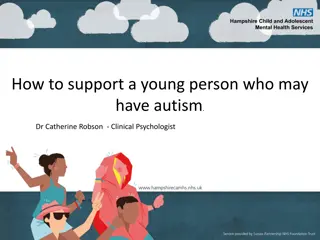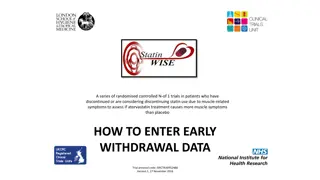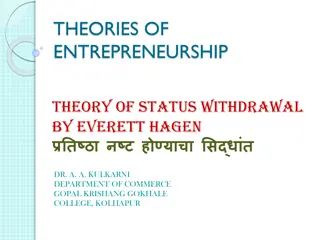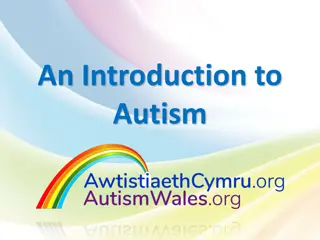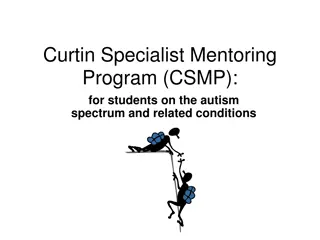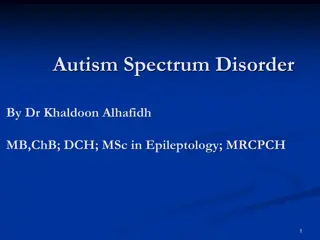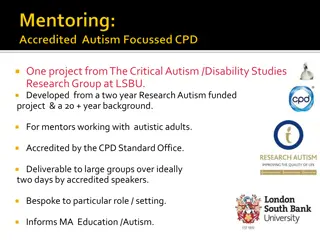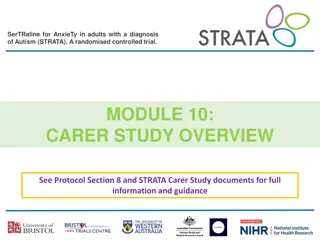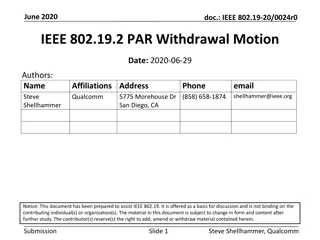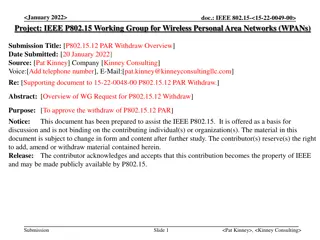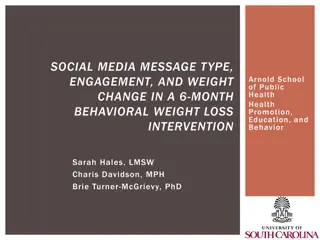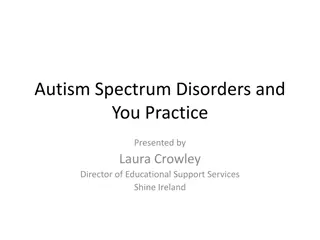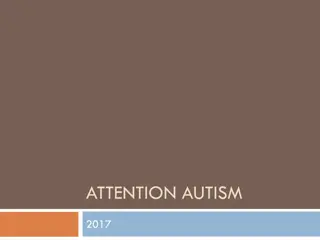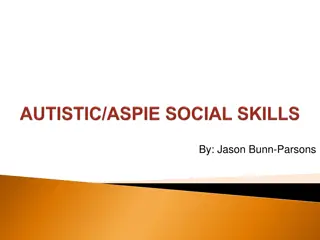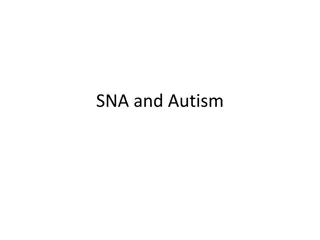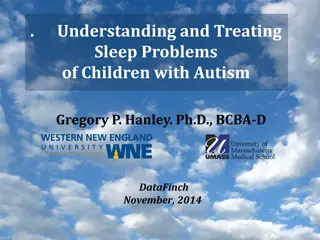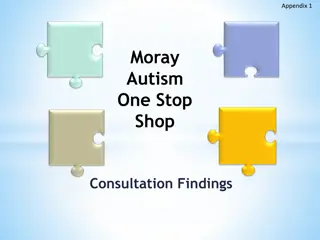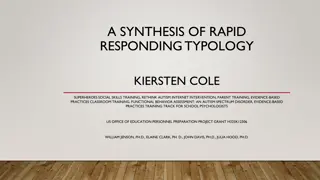Managing Participant Withdrawal in Autism Study: Key Procedures
This training module details important procedures for withdrawing participants from medication and questionnaires in a study focused on treating anxiety in adults with autism. Participants are allowed to withdraw for any reason at any time, with recommended guidance on medication discontinuation and information on changing study permissions. Careful consideration is given to participant rights and the role of carers in the study. Special procedures are outlined for those not willing to start or continue medication.
Download Presentation

Please find below an Image/Link to download the presentation.
The content on the website is provided AS IS for your information and personal use only. It may not be sold, licensed, or shared on other websites without obtaining consent from the author. Download presentation by click this link. If you encounter any issues during the download, it is possible that the publisher has removed the file from their server.
E N D
Presentation Transcript
SerTRaline for AnxieTy in adults with a diagnosis of Autism (STRATA). A randomised controlled trial. MODULE 11: Change of Permissions / Withdrawal
Presentation format: two options Presentation format: two options You have two options for viewing this presentation: You can view it as a slide show, which will play all audio for each slide. Along the top, click Slide Show , then click the first option, From Beginning OR, you can click through each slide manually on the left, clicking play to listen to the required listening Required listening is denoted by this symbol in the top right hand corner Optional listening is denoted by this symbol in the bottom left hand corner Please note that you will need to use the right arrow key (or navigate as if going to the next slide) on the keyboard to play the audio
Content Content This training module covers key information about the procedures for: 1. Withdrawing a participant from medication only (i.e., IMP Discontinuation) 2. Withdrawing a participant from medication and questionnaires (i.e., Withdrawal from follow-up) 3. Other changes to a participant s permissions (e.g. changing preferences for having qualitative interview). These icons are used throughout this module: Relevant study documents available in the site file Relevant sections of the study database Some slides have required listening, denoted by this symbol in the top right hand corner There is audio description of all other content slides available (optional)
Change of Permissions / Withdrawal Overview
Withdrawal from study (or change of permissions) Withdrawal from study (or change of permissions) See Section 6.17 and 8.4 of the Study Protocol for further information about changing a participant s and Carer s study permissions and/or withdrawing them from the study Participants can choose to withdraw for any reason at any time during their involvement in the study. Although participants are not obliged to give their reason/s for withdrawing, site teams should make a reasonable effort to ascertain the reason/s, while fully respecting the participant's rights. Participants can withdraw from: (1) Taking study medication only (2) Providing data to the study (N.B. In both scenarios, future prescriptions of study medication will be stopped). Participants who have taken at least one study medication capsule should be advised that they are recommended to take the treatment regimen for at least 16-weeks (i.e. until the primary outcome timepoint) before deciding if the treatment works or not. The PI can decide to withdraw participants based on their clinical opinion at any time during the study. Participants who have taken at least one study medication capsule should be provided information about how to downward titrate the study medication and how to dispose of it. Carers will remain in the carer study unless they choose to withdraw or if they are unable to continue for a clinical reason. The carer does not need to withdraw if the study participant (i.e. the person for whom they are a carer) withdraws from the main study. There are special procedures for participants who have not started taking their medication at the 1-2 week safety check, and are no longer willing to take their medication (See Module 7: Safety Check Appointments).
Change of Permissions / Withdrawal Database Overview Admin Project A040 - Participants
Admin Database Overview Admin Database Overview Instruments relevant to Change of Permissions/Withdrawal are in subsequent columns to the right of study ID The Change of Permissions dashboard displayed contains every data collection instrument relevant to Change of Permissions/Withdrawal Participant study ID numbers are in the first column WD Medication For withdrawing a participant ONLY from study medication WD Questionnaires For withdrawing a participant from study medication AND questionnaires (i.e. providing data to the study) WD Carer For withdrawing a carer from the carer study only Other Change For recording another change of permissions (i.e. contact for interviews and/or future research)
Withdrawal from Study Medication Only (IMP Discontinuation) Admin Project A040 - Participants
IMP Discontinuation IMP Discontinuation 1. On the Admin Database Project A040 Participants, select the WD Medication data collection instrument for the relevant participant you want to withdraw from medication.
IMP Discontinuation IMP Discontinuation 2. Complete the fields with information provided about the withdrawal: Withdrawal date Requestor Reason 3. Scroll down and there is a comments box at the bottom of the page for any relevant comments you want to make. 4. Set the form to complete , save and exit the form. 5. An IMP Discontinuation Alert (automatic email) will be sent to the site PI, prescribers, and the central pharmacy.
Withdrawal from Medication and Questionnaires (Withdrawal from providing data to the study) Admin Project A040 - Participants
Withdrawal from providing data to study Withdrawal from providing data to study Important! Remember to withdraw the participant from medication as well to stop future prescriptions 1. On the Admin Database Project A040 Participants, select the WD Medication data collection instrument for the relevant participant you want to withdraw from medication.
Withdrawal from providing data to study Withdrawal from providing data to study 2. Complete the fields with information provided about the withdrawal: Withdrawal date Requestor Reason 3. Scroll down and there is a comments box at the bottom of the page for any relevant comments you want to make. 4. Set the form to complete , save and exit the form. 5. An IMP Discontinuation Alert (automatic email) will be sent to the site PI, prescribers, and the central pharmacy.
Withdrawal from providing data to study Withdrawal from providing data to study 6. Select the WD Questionnaires data collection instrument for the relevant participant you want to withdraw from questionnaires.
Withdrawal from providing data to study Withdrawal from providing data to study 7. Complete the fields with information provided about the withdrawal: Withdrawal date Requestor Reason 8. Scroll down and there is a comments box at the bottom of the page for any relevant comments you want to make. 9. The page will display a reminder to ensure that the WD Medication form is also completed. 10. Set the form to complete , save and exit the form. 11. An automatic email will be sent to the site PI, prescribers, and the central pharmacy about the withdrawal.
Withdrawal from the Carer study Admin Project A040 - Participants
Withdrawal from Withdrawal from Carer Carer study study 1. On the Admin Database Project A040 Participants, select the WD Carer data collection instrument for the relevant main study participant whose carer you want to withdraw from the carer study.
Withdrawal from Withdrawal from Carer Carer study study 2. Complete the fields with information provided about the withdrawal: Withdrawal date Requestor Reason 3. Scroll down and there is a comments box at the bottom of the page for any relevant comments you want to make. 4. Set the form to complete , save and exit the form.
Other Change to Study Permissions Admin Project A040 - Participants
Other Change to Study Permissions Other Change to Study Permissions 1. On the Admin Database Project A040 Participants, select the Other Change data collection instrument for the relevant participant.
Other Change to Study Permissions Other Change to Study Permissions 2. Complete the fields with information provided about the withdrawal: Date Requestor Interviews Future Research 3. There is a comments box at the bottom of the page for any relevant comments you want to make. 4. Set the form to complete , save and exit the form.
Unblinding STRATA Medication Discontinuation Notice Letter STRATA Withdrawal from Trial Notice Letter STRATA GP Medication Discontinuation Email from Study Team STRATA GP Medication Discontinuation or Withdrawal Letter
Unblinding Unblinding See section 6.15 of the Study Protocol for information about unblinding Participants who withdraw will be given the option of being unblinded (i.e., finding out what treatment they were taking) at the time of withdrawal, or after the 16-week primary outcome - whichever comes later. 1. The local RA will immediately send the participant a STRATA Medication Discontinuation Notice Letter, or a STRATA Withdrawal from Trial Notice Letter (depending on the type of withdrawal). These letters will advise the participant that they should arrange an appointment with their GP (or equivalent in Australia) if they want to find out what treatment they were allocated. 2. If a participant discontinues medication prior to the 16 week primary outcome, the participant s GP (or equivalent in Australia) will be immediately informed of their patient s discontinuation of trial treatment via a STRATA GP Medication Discontinuation Email from study team. In this instance, the GP is only notified of withdrawal from medication, not what the treatment allocation is. This is because GPs and participants should remain blinded until 16 weeks medication discontinuation occurs (this does not affect emergency unblinding processes for safety reasons which remain unchanged).
Unblinding Unblinding See section 6.15 of the Study Protocol for information about unblinding 3. At the time of withdrawal, or after the 16-week primary outcome - whichever comes later. The participant s GP (or equivalent in Australia) will be informed of their patient s treatment allocation via a STRATA GP Medication Discontinuation or Withdrawal Letter, sent by the study pharmacist (or delegate) at the central pharmacy, for they are study staff members who are unblinded. The local RA will send aSTRATA GP Medication Discontinuation or Withdrawal Letter to the central study pharmacist, who will enter the participant s treatment allocation on the letter and send it directly to the participant s GP. (N.B: (1) Ensure that a secure method is used to send the letter, such as NHS Mail; (2) Provide address/contact details of the patient s GP to the pharmacist). Tip add a Calendar reminder in Outlook to send this letter to Pharmacy for completing just prior to the 16-week point, alongside checking the participant has completed their 16-week questionnaire (if not fully withdrawn)
Change of Permissions/Withdrawal Checklist STRATA Medication Discontinuation Notice Letter STRATA Withdrawal from Trial Notice Letter STRATA GP Medication Discontinuation Email from Study Team STRATA GP Medication Discontinuation or Withdrawal Letter Admin Project A040 - Participants
Change of Permissions/Withdrawal Checklist Change of Permissions/Withdrawal Checklist Withdrawal from medication only: WD Medication data collection instrument completed on Admin Project A040. STRATA Medication Discontinuation Notice Letter has been sent to the participant informing them of how to downward titrate and dispose of the study medication. STRATA GP Medication Discontinuation Email from study team has been sent to the participant s GP (or equivalent in Australia), if the participant discontinues treatment prior to 16 weeks. STRATA GP Medication Discontinuation or Withdrawal Letter has been securely sent to the study pharmacist, with the address/contact details of the participant s GP (or equivalent in Australia). Withdrawal from medication and questionnaires: WD Medication data collection instrument completed on Admin Project A040. WD Questionnaires data collection instrument completed on Admin Project A040. STRATA Withdrawal from Trial Notice Letter has been sent to the participant informing them of how to downward titrate and dispose of the study medication. STRATA GP Medication Discontinuation Email from study team has been sent to the participant s GP (or equivalent in Australia) STRATA GP Medication Discontinuation or Withdrawal Letter has been securely sent to the study pharmacist, with the address/contact details of the participant s GP (or equivalent in Australia). Carer withdrawal from carer study: WD Carer data collection instrument completed on Admin Project A040. Carer informed that they have been withdrawn from the carer study. Other change of permissions: Other Change data collection instrument completed on Admin Project A040. Participant/Carer informed that their permissions have been changed.
Questions? Questions? 1 Check the FAQs on the study website: www.bristol.ac.uk/strata 2 Email the Central Research Team (University of Bristol, UK): strata-rct@bristol.ac.uk
Confirmation of training Confirmation of training When you have completed this training module, please let the STRATA Central Trial Team (UK) know by completing an online form. See: https://forms.office.com/r/vraB5ttrnc Your form should be saved and retained in your Investigator Site File.
Acknowledgements Acknowledgements Sponsor: Chief Investigator: Co-investigators: UK: University of Bristol (UoB). Dr Dheeraj Rai, Consultant Senior Lecturer in Psychiatry. Dheeraj.Rai@bristol.ac.uk Professor David Kessler, Professor of Primary Care, University of Bristol Professor Nicola Wiles, Professor of Epidemiology, University of Bristol Dr Stephanie J MacNeill, Lecturer in Medical Statistics, University of Bristol Dr Nicola Mills, Senior Research Fellow in Health Services Research, University of Bristol Dr Joanna Thorn, Research Fellow in Health Economics, University of Bristol Dr Ailsa Russell, Reader and Clinical Psychologist, University of Bath Mr Jack Welch, Autistic advocate and Discover insight group member/contributor Professor Traolach Brugha, Professor of Psychiatry, University of Leicester Professor David Baldwin, Professor of Psychiatry, University of Southampton Professor Peter Langdon, Professor of Clinical and Forensic Psychology, University of Warwick Dr Regi Alexander, Consultant Psychiatrist, Hertfordshire Partnership University NHS Foundation Trust Dr Raja Mukherjee, Consultant Psychiatrist, Surrey and Borders Partnership NHS Foundation Trust Associate Professor Helen Leonard, NHMRC Senior Research Fellow and Assoc Prof, University of Western Australia Dr Emma Glasson, Senior Research Fellow/Study Coordinator, University of Western Australia Professor Sergio Starkstein, Professor of Psychiatry, University of Western Australia Australia: The University of Western Australia (UWA) Trial Manager(s): Mr Doug Webb and Dr Amanda Lewis, Bristol Medical School, University of Bristol, UK. strata-rct@bristol.ac.uk Senior Research Associate: Dr Jade Eloise Norris, Bristol Medical School, University of Bristol, UK Senior Research Officer: Ms Katherine Hatch, Freemantle Hospital, University of Western Australia Study Management: This study was designed and delivered in collaboration with the Bristol Randomised Trials Collaboration (BRTC), a UKCRC registered clinical trials unit (CTU) which, as part of the Bristol Trials Centre (BTC), is in receipt of National Institute for Health Research CTU support funding. Funding Acknowledgement and Disclaimer: This study is funded by the National Institute for Health Research (NIHR) HTA Programme (Ref: 127337). The views expressed are those of the author(s) and not necessarily those of the NIHR or the Department of Health and Social Care. The authors and University of Western Australia acknowledge funding from the National Health and Medical Research Council (Project Grant 1171206). The contents of the published material/website are solely the responsibility of the authors and do not reflect the views of NHMRC. REDCap: Study data are collected and managed using REDCap (Research Electronic Data Capture, Harris PA, et al. J Biomed Inform. 2009 Apr;42(2):377- 81) hosted at the University of Bristol.
